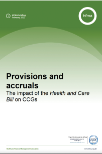Technical / Technical review - March 2022
A consultation on the 2022/23 national tariff payment system has proposed revising the variable element deduction for elective activity below the agreed baseline (104% of 2019/20 activity). Initially, NHS England and NHS Improvement set the deduction at 50%, but have now proposed 75%, bringing it in line with guidance on elective recovery. The amendments also address concerns that NHS providers subcontracting additional activity to the independent sector could have to pay 100% of tariff, but only be paid at 75%. The consultation documents propose excluding subcontracted activity from aligned payment and incentive arrangements, with payments to subcontractors made outside of tariff rules. The consultation closes on 25 March.
NHS England and NHS Improvement have proposed removing the requirement to sign up to a system collaboration and financial management agreement (SCFMA). They said this would reflect the tariff arrangements for 2022/23, and the duty of integrated care boards (ICBs) and partner trusts to work together to deliver system financial balance. The change was proposed in a consultation on the new standard contract. A model SCFMA will still be available for systems that wish to adopt it. There are other changes in the draft contract to reflect new or updated national policies, such as wider zero tolerance standards, and smaller changes, such as the removal of separate arrangements for the local incentive scheme, which the national bodies believe is now redundant.
The planned provider selection regime will not begin until after ICBs are formed, the Department of Health and Social Care said. ICBs are due to launch formally in July. The news comes as the Department opened a supplementary consultation on the regime, which will give commissioners greater flexibility when arranging services. The Department wants to check with the service that its proposals will achieve its ambitions, including making integration and collaboration easier. The regime would remove mandatory competition, though it will remain an option. Existing services could continue where they work well and there is no value for patients, taxpayers and local people in seeking an alternative provider. The new regime would not apply to the procurement of goods and pharmaceuticals.
Guidance has been issued on the commissioning for quality and innovation (CQUIN) financial incentive scheme, which is set to be reintroduced in 2022/23. The scheme was suspended in 2020/21 and 2021/22 due to the introduction of a simpler financial regime as the NHS focused on responding to Covid-19. However, it is being reintroduced as part of the new aligned payment and incentive (API) contracting arrangements – CQUIN payments will be made under the fixed element of API contracts, with adjustments possible (for underperformance, for example) under the variable element. The value of CQUIN is 1.25% of the fixed element of payment, which can only be earned under the five most important indicators in each contract.
 The HFMA has updated its briefing that aims to support members as clinical commissioning groups close down and integrated care boards are established. The document, Provisions and accruals: the impact of the Health and Care Bill on CCGs, which was initially published in draft form, has been reissued following a review by members. Overall, three documents have been published to assist a smooth transition between organisations, ensuring that legacy issues are captured and managed.
The HFMA has updated its briefing that aims to support members as clinical commissioning groups close down and integrated care boards are established. The document, Provisions and accruals: the impact of the Health and Care Bill on CCGs, which was initially published in draft form, has been reissued following a review by members. Overall, three documents have been published to assist a smooth transition between organisations, ensuring that legacy issues are captured and managed.
Changes in member contributions to the NHS Pension Scheme have been postponed until 1 October. The Department of Health and Social Care hopes the six-month delay will mitigate the pressure on take-home pay from 1 April, when the cost of utilities and other goods and services are due to rise. The delayed measures include a shift in the basis of the calculation of contribution rates. For employed staff, this will move from notional whole-time equivalent pensionable earnings to their actual annual rate of pensionable pay. The Department believes this is fairer to part-time staff. Tiering of contributions based on earning bands will remain, but the number of tiers and the gradient between tiers will be reduced. As a result of the overall changes, contribution rates will decrease for part-time staff and higher earners.
NHS Pension Scheme employer contribution rates will remain unchanged in 2022/23, and employers will continue to be supported to make these contributions. NHS England and NHS Improvement have confirmed the employer rate will remain at 20.6% of pensionable pay, with an additional administration levy of 0.08% in 2022/23. Central funds will cover 6.3%, with employers contributing 14.38% of pensionable pay. Employer contributions increased from 14.3% to 20.6% in April 2019, but, under transitional arrangements, central support was introduced in 2019/20 and each of the subsequent years to ensure financial stability.
The Department of Health and Social Care has issued an updated version of its Group accounting manual 2021 to 2022, which details changes made to the document for this year. The changes include revised fair pay disclosures, expanded guidance on the applicability of Managing public money to all Department group bodies, and clearer guidance for NHS trusts on performance reporting and incorporating performance against national quality indicators.
Related content
This webinar series offers colleagues of ICS organisations the opportunity to discuss common priorities, challenges, and successes within their field.
We are excited to bring you a fun packed Eastern Branch Conference in 2025 over three days.